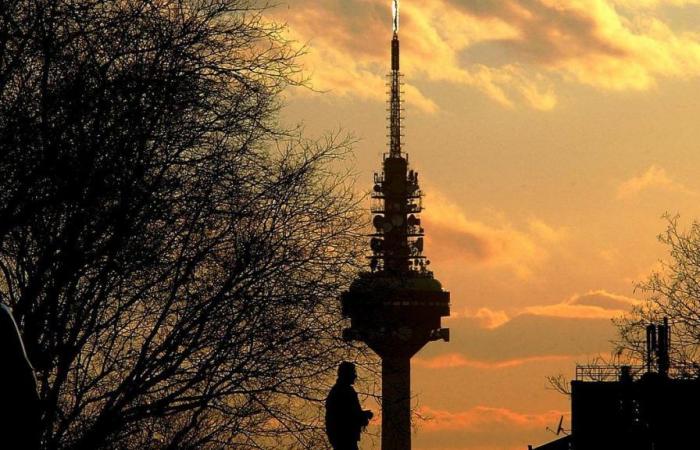
In recent years, books with jokes and battles about what were the first decades of TVE’s history have become fashionable. Publications that, in some way, have contributed to idealizing a Spanish Television that no longer exists. Now another one has just gone on sale, Pirulí Forever: TV doesn’t give up (Applehead Team), written by Gerardo Reyes and illustrated by Ivan Garcia, which does not aspire to function as a nostalgic essay, but rather aims to advance the story, explaining the recent history of TVE. Or, in the author’s own words, analyze the lights and shadows of an audiovisual era that culminated with the arrival of payment platforms and in which the state-owned television organization has had to become adult, independent and useful, without ever losing in view of their public service obligation.
“The arrival of the private ones urged Spanish Television to redefine its function and put it at the feet of the horses of a new panorama that brought with it competition, flight of signings, counterprogramming and… In short, the birth of the dreaded audiometer, which TVE faced with an added dilemma: facing the battle with different weapons to aspire to be competitive without renouncing its obligations as state television of a consolidated democracy,” explains Reyes. “Trying to balance these two sides of the scale has been its great headache in these last 33 years (1990-2023), which make up the second and hectic half of its existence and which follow those first years (1956-1989) in those who enjoyed the flattery and permissiveness that comes with the exclusivity of being the only child.”
Q. ‘RTVE: Everyone’s’ has been the most recognizable corporate slogan in the public. Why did you start shying away from it a few seasons ago?
A. I think it is impossible for a television network, whatever it may be, to aspire today, with the amount of offer we have, to be ‘everyone’s’. The change in concept, going from saying ‘everyone’s’ to ‘the one you want’, has been correct on their part, as it reflects the change that the audiovisual panorama has undergone. That ‘what you want’ has to do with that personalized TV, organizing your programming the way you want… That consumption model that, perhaps with the exception of news, almost all of us already have.
Q. You talk about the good reception that spaces for reflection and exchange of opinions such as The key, but he also comments that, after the consolidation of democracy, the debate became a residual television genre on TVE. Weren’t the boards of directors of the house in charge of promoting uncomfortable situations for the government in power on public television?
A. That’s right. First of all, I want to make it clear that everything I comment has to do with what I perceive as a viewer, since I am not a journalist or specialized critic. In the early nineties, with the culture of the big ball and the boom economic situation that was experienced then, it seemed that public television had forgotten a bit of that spirit that existed in the transition.
Q. The interviews and debates were then adopting more frivolous approaches, while communicators such as Mercedes Milá or José Luis Balbín landed on the recently inaugurated Antena 3.
A. Exactly. María Teresa Campos always commented in interviews that she fought a lot to keep the debate table in Life moves on, but neither one government nor another allowed it. That was one of the things that pushed her to go to Telecinco. Debate tables began to operate in that chain, to the point that today they are the main ingredient of any morning gathering.
Q. In Lollipop Forever describes the TVE of the nineties as a fresh and colorful television, very Italianized, that perfectly portrayed the collective high of the Spain of ’92.
A. Yes, that is the time of Hello, Raffaella!, The traffic light…We found programs full of dancers, smiling hostesses and choreographies that would be unthinkable today due to all the clichés they transmitted and because it is very frivolous television.
Q. How did the private ones change the television language?
A. When one watches programs from that time, one perceives that they lacked naturalness. Everything was then very scripted. That’s why I mention that the private ones, especially Telecinco, definitively broke the fourth wall by bringing a more spontaneous and dynamic language. This especially exploded with the arrival of reality shows, where naturalness and face-to-face language already prevailed. Today there are no more formats like What do we bet?, where everything was bombastic and there were great sets. Entertainment has been oriented towards more austere programs, where the viewer no longer sees as much fantasy as in those spaces of the nineties.
Q. How was TVE managed in that period, at the beginning of the 2000s, halfway between analogue and digital?
A. The first decade of the 2000s was a time of transition, indeed. TVE had a great success with Triumph operationwhich turned the concept around very well reality and allowed the network to reconnect with the young audience. That’s where they started talent showswhich sought to convey the idea of productivity, as opposed to the sedentary life that was conveyed Big Brother. TVE had other successes throughout that decade, such as the comedy program Nui Girlwhich also served to move away from that constricted language, although it also continued to have vestiges of the past such as Night out.
Q. The public was also leaving behind the stars with the stratospheric cachet typical of ‘Felipism’ and ‘Aznarism’.
A. Yes, it gave the impression that TVE was getting off the bandwagon of million-dollar signings managed by some networks and others to focus on what was really expected from public television. In fact, at that time those big names that existed began to disappear. Telepassion, for example, was a fantasy in the nineties, when it had characters who were the first television stars. But those names were leaking to the private companies, so TVE had to recycle itself and look for a new identity.
Q. How did other scenarios affect you, such as the reorganization in 2007 as a Public Corporation under a new management framework or the analogue blackout and the implementation of DTT in 2008?
A. That time and that change in concept were vital to lay the foundations for the public television model that we have today. From there you begin to see the function of the contents of each of its chains. It has always been said that television’s basic functions were to inform, educate and entertain. In this sense, Channel 24 Hours is responsible for informing, La 2 for training and La 1 for entertaining.
Q. He points out that, at a given moment, La 2 It began to be perceived as a hodgepodge of poorly cohesive content.
A. Yes. When Teledeporte arrived, for example, the sports competitions went to that network. With RTVE Play, international series are already there. And children’s programming, which in the nineties was a very exclusive ghetto of La 2, went to Clan. In short, La 2 was left a bit orphan. Although little by little it recovered its identity, and for five or six years the results have been seen, with certain original programs of its own production, such as Laika orbit either The flux capacitorwhich match very well with the DNA of the chain.
Q. Did you find the decision to suppress advertising on TVE to be clumsy?
A. At the time I celebrated it, because it also seemed to me to be a basic principle of public television. Almost all of them follow that model in Europe. But it is clear that, in the long run, it has made TVE less competitive, and even today there are many voices that are requesting the return of advertising. As a viewer, I sincerely appreciate it, especially at the level of certain types of content such as movies.
Q. What assessment do you make of the work of José Pablo López as content director of RTVE?
A. As a viewer, it seems to me that his arrival meant for TVE the return of ambition, of the desire to be competitive again. José Pablo knew how to connect with a certain segment of the audience and has had great successes. Just look at the change in perception in recent years regarding the chain. Another thing is the final & mldr of him; But the endings are always the same when we talk about the public entity, which is subject to so many controls. It is very difficult for projects to come to fruition, there are always setbacks,…
Q. Were you surprised by his dismissal due to the internal war that the signing of David Broncano entailed?
A. What happened with Broncano has been a war of thrones in which, furthermore, we have all participated. In fact, I don’t know to what extent it is necessary for all those decisions that we see transmitted in parliament, those sides and those cliques that are created, to reach the viewers. I think this does a disservice to the chain’s image. In any case, I personally don’t finish watching Broncano on TVE, especially seeing the line he leads with his program on Movistar Plus +. Although we cannot judge things before seeing them. What’s more, I think that a lot of benefit can be gained from the signing in terms of promoting the faces of the network and as a boost for the programs that are broadcast later.
Q. How would you say that national fiction has been positioned in the public with respect to the rest of the options?
A. Its series offering has historically been one of TVE’s great strengths. Right now it is, like everything else, relocating and trying to see what life it can have on free-to-air television. I think that public television has until now made series that only it could make. I’m referring to those historical fictions, with more social themes… I love that line and I think it’s the one I should continue exploring. In reality, both public and private companies have had a difficult time staying current over the last two seasons. TVE now has some projects that are along those lines, and that are the projects that I at least expect from a public television, like that fiction by Javier Olivares, Ena, based on the novel about the life of Queen Victoria Eugenie.





